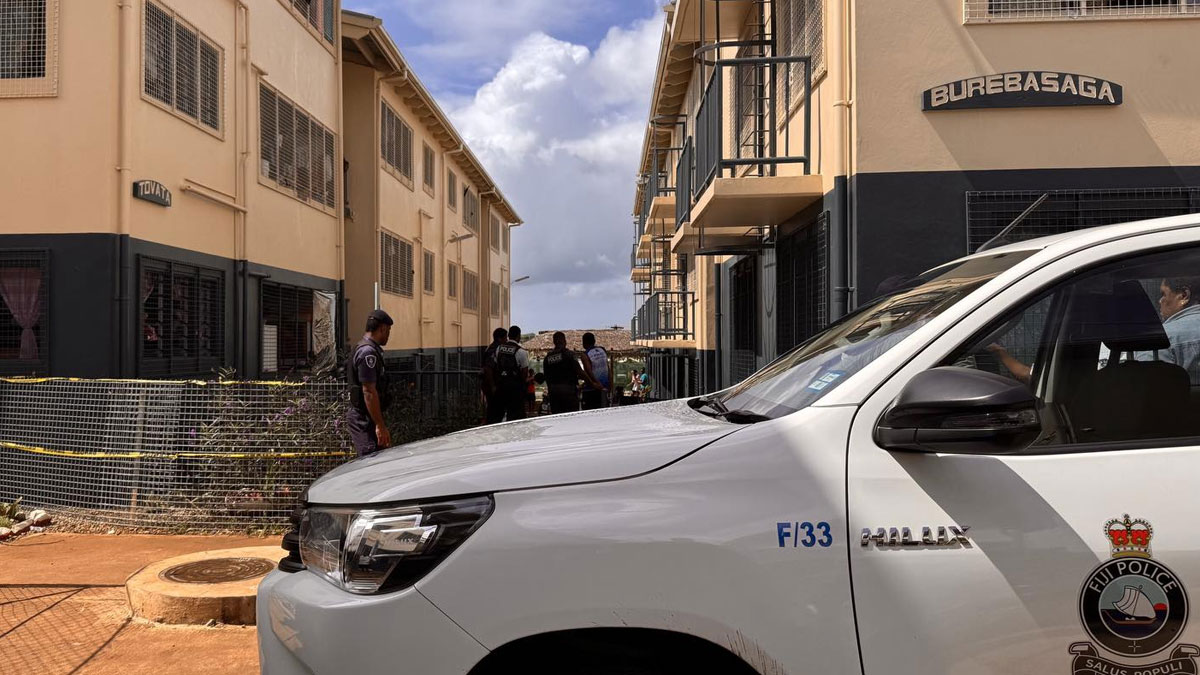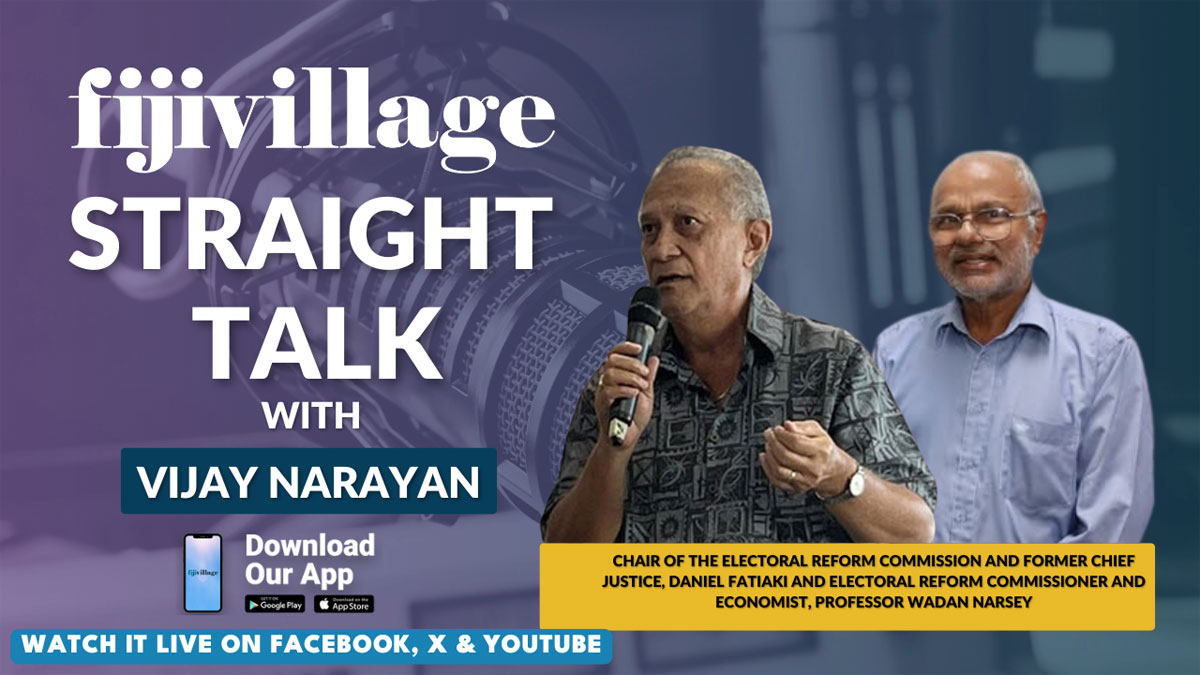
Chair of the Electoral Reform Commission and former Chief Justice, Daniel Fatiaki and Electoral Reform Commissioner and economist, Professor Wadan Narsey on fijivillage Straight Talk With Vijay Narayan.
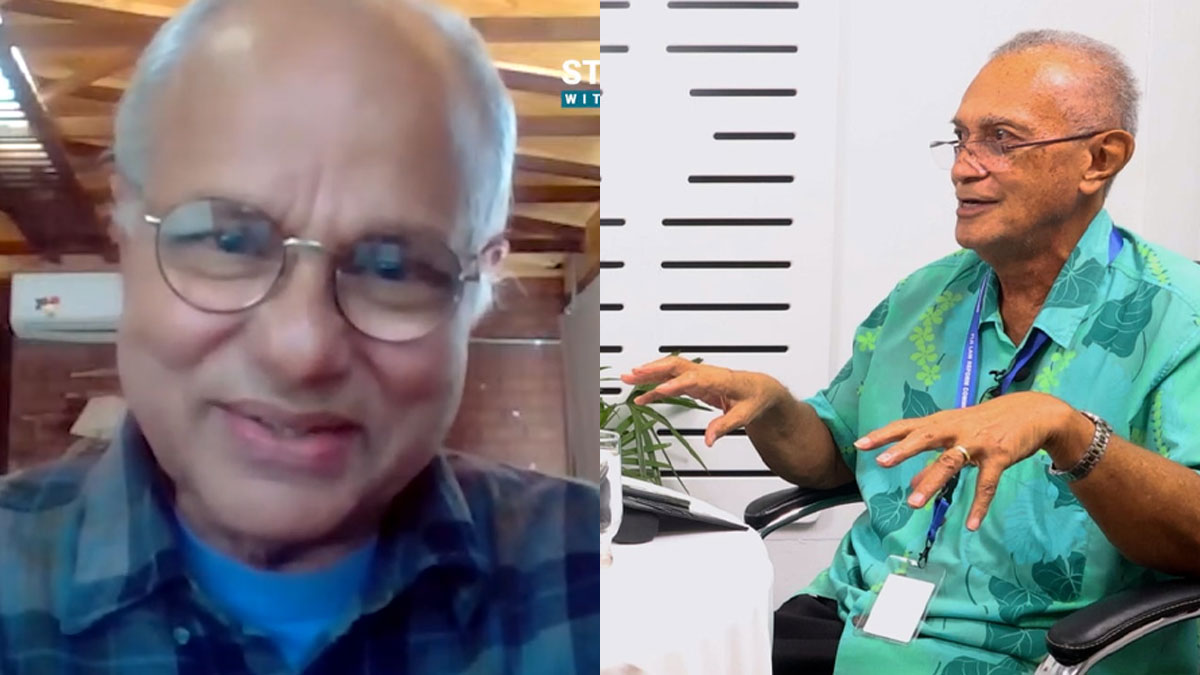
The last set of military coups, removed democratically elected governments, including how the laws are made, and it’s a real tragedy that we were ruled by decrees.
Chair of the Electoral Reform Commission and former Chief Justice, Daniel Fatiaki highlighted this during fijivillage Straight Talk with Vijay Narayan when asked what past coups did to the country’s lawmaking process.
Fatiaki says he can’t even understand how can we be ruled by decree.
The Electoral Reform Chair says he studied constitutional law and that in any democratic government, the laws are made by Parliament for the people.
He says one doesn’t study coup law in Law School, you study proper constitutional law and coups are illegal things.
When asked about the negative impact of making laws without consultation under Parliamentary Standing Order 51, Fatiaki says there's no foundation at all for decrees.
He says the laws passed by Parliament reflect the view of the majority while a decree reflects nothing but the authoritarian dictatorship that instituted it.
The last set of military coups, removed democratically elected governments, including how the laws are made, and it’s a real tragedy that we were ruled by decrees.
— fijivillage (@fijivillage) April 3, 2025
Story Link: https://t.co/QmI26LK6Wy pic.twitter.com/To8BYrYiEM
The Chair says a classic example is the FNPF Decree 51 which ripped the heart out of pensioners as those receiving 15 to about 25 percent were forced to accept 9 percent. He says the pensioners went under the poverty line as a result because no consultations were done.
Fatiaki says it was just done by authority, whoever has the power.
He says that decree remains today and no government has bothered to actually ratify it and make it an Act of Parliament.
He says the level of unlawfulness in this country is shocking.
The Chair stressed that his four sons were born post-1987 and they lived their entire lives in coups and it wouldn't surprise them if they think that a coup is the way to change laws or governments.
Fatiaki says this is his effort to try and give his grandchildren true democracy and protect them from more coups.
Meanwhile, Electoral Reform Commissioner and economist, Professor Wadan Narsey highlighted that the elected government from 2014 to 2022, had eight years to bring the Constitution to parliament and get it approved.
Professor Narsey says the Bainimarama government wrote it into their Constitution that to change a single letter, you had to have three-quarters of a parliament and 75 percent of registered voters to say yes.
Nationwide consultations for the electoral law reforms start on Monday.
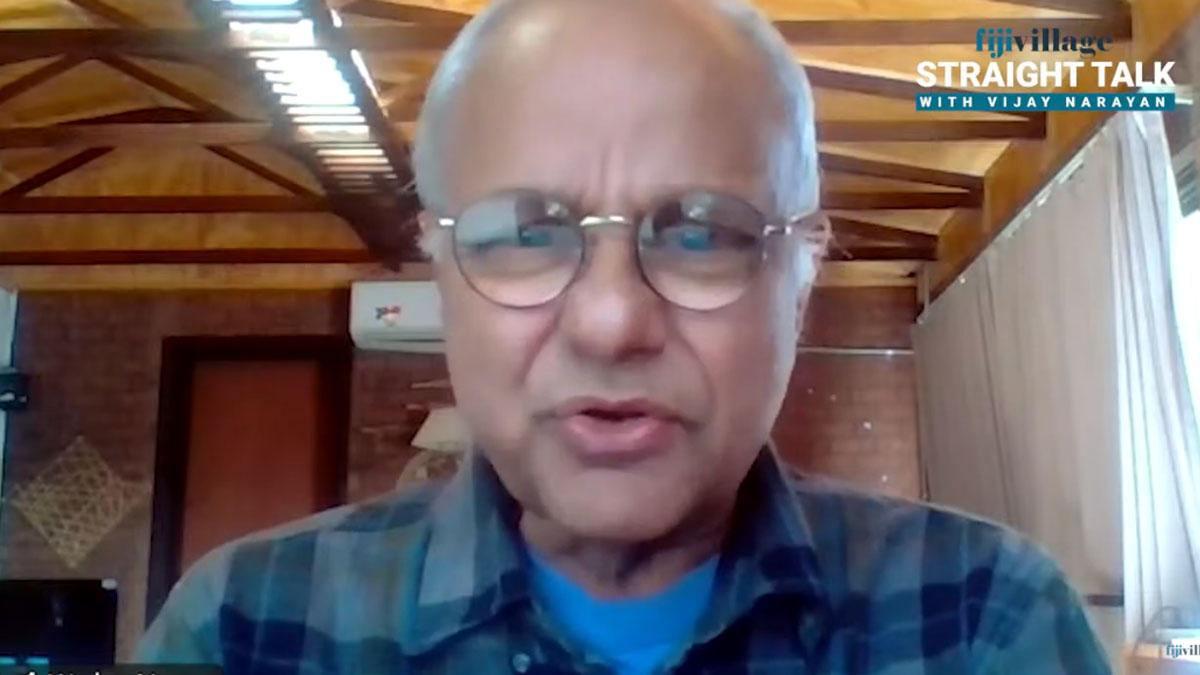
More than $5 billion has been lost because of the coups in Fiji and all of these events have resulted in our country’s progress being stunted. We could have doubled our Gross Domestic Product if coups didn’t happen.
Electoral Reform Commissioner and economist, Professor Wadan Narsey highlighted this on fijivillage Straight Talk with Vijay Narayan when asked how much has the country lost through the coups from 1987 to date.
Professor Narsey says every coup has hurt the Fiji economy where there’s a drop in the graph and when the former Prime Minister, Voreqe Bainimarama asked him to join the military council, he told him that the coup is not going to be good.
He says the economy virtually mirrors what happens to the tourism industry and he has written his books where he talks about the cost of coups.
More than $5 billion has been lost because of the coups in Fiji and all of these events have resulted in our country’s progress being stunted. We could have doubled our Gross Domestic Product if coups didn’t happen.
— fijivillage (@fijivillage) April 3, 2025
Story Link: https://t.co/gbL2OqHpaF pic.twitter.com/jfqDYSTyn1
The Electoral Reform Commissioner says you have a graph going upwards, like the tourism arrival and when a coup happens, the graph drops, so the GDP of Fiji has been doing that right from 1987.
He says one of the interesting comparisons he made with Fiji is Mauritius, which is a small island country like ours, and their GDP per capita in 1950 was less than ours.
However, because of the coups, we suffered and suffered and today their GDP per capita is twice of Fiji and as a result only our coup makers in Fiji have benefitted.
He says the coups have done enormous harm.
Professor Narsey further says how you can explain it to ordinary people is just think about what would happen if you go to the supermarket and your income today was twice what you are receiving now.
He says it is absolutely necessary for people to take part in the consultations for the electoral law reforms.
Nationwide consultations for the electoral law reforms start on Monday.
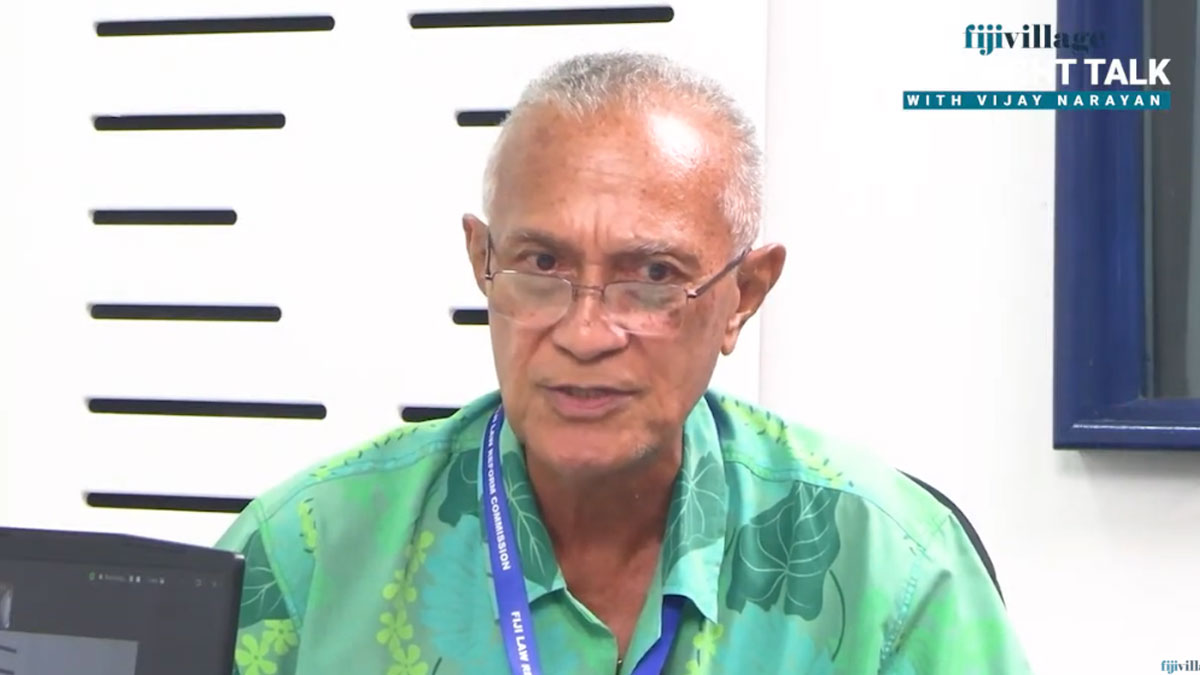
The Electoral Reform consultation will be people’s first genuine attempt to participate in democracy and people should turn up, and speak to us.
Chair of the Electoral Reform Commission and former Chief Justice, Daniel Fatiaki highlighted this during fijivillage Straight Talk with Vijay Narayan.
Fatiaki says the review of electoral laws is part of the democratic process and they want people to tell them what they like and don’t like about the current electoral system which was brought in through decrees.
He says people should tell them how they think the system could be improved and what they see about people being elected to the Parliament.
Watch on TikTok
The Chair says he has lived through the 1997 Constitution and what happened under that Constitution's electoral system, frankly, was a disaster.
Fatiaki says people are inviting them to go back to the 1997 Constitution and he said that they don’t want to go back, however, they have an opportunity to recommend to this country an electoral system that won't allow us to go back there.
Fatiaki and Electoral Reform Commissioner and economist, Professor Wadan Narsey are part of the Commission to review the electoral system of Fiji.
Nationwide consultations for the electoral law reforms start on Monday.
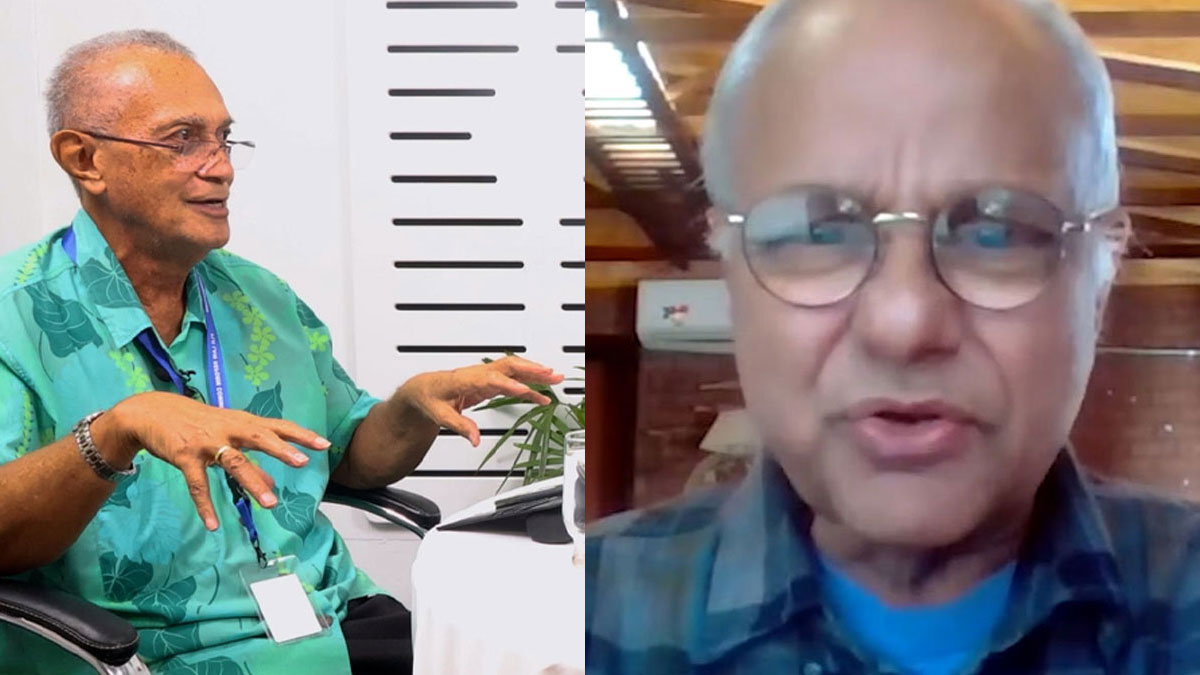
As people have a chance to give their opinions on the country’s electoral laws, the Fiji Law Reform Commission Chair and former Chief Justice, Daniel Fatiaki and Commissioner Professor Wadan Narsey don’t agree with bringing back the ethnic-based voting system.
They highlighted this during fijivillage Straight Talk with Vijay Narayan when asked whether they would get rid of things like race-based voting.
Fatiaki says the Commission he is chairing is very unlikely to recommend that we go down that route as the nation has developed enough to be able to vote as a nation rather than on ethnic lines.
He says this does not mean that people feel uncomfortable voting for their own.
Professor Narsey says we have moved beyond those ethnic constituencies and people can also think about one statistical result of a proportional system.
The Commissioner says there are a lot of people who came into the Parliament under the 'Superman' umbrella, but there is a mixture of indigenous Fijians and Indo-Fijians.
Fatiaki and Professor Narsey are part of the Commission to review the electoral system of Fiji.
We had also sent questions to different party leaders to get their responses to the comments made by the Electoral Reform Chair and Commissioner.
They are yet to respond.
Nationwide consultations for the electoral law reforms start on Monday.
You can watch the full Straight Talk video on our website fijivillage.
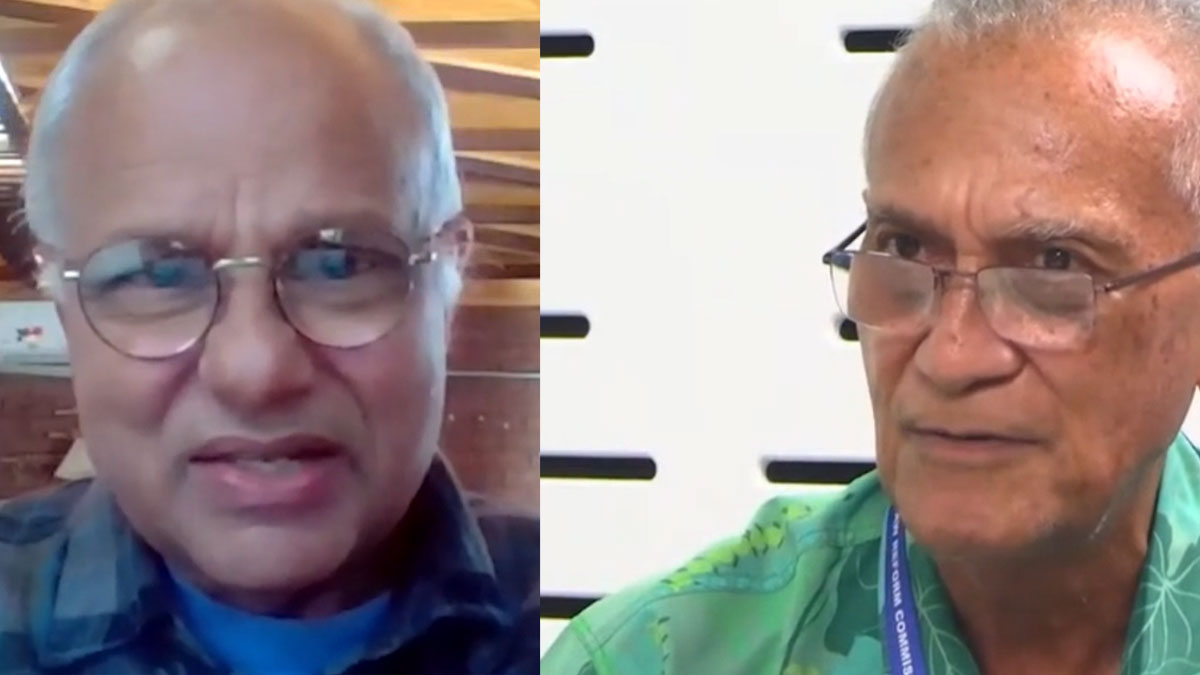
Candidates and politicians need to declare their assets and liabilities so that people can see that they are not feathering their nests through their parliamentary decisions.
Electoral Law Reform Commissioner and economist, Professor Wadan Narsey highlighted this during fijivillage Straight Talk with Vijay Narayan when asked if they will still profess for the declaration of assets and liabilities.
While responding to the question, Commission’s Chair and former Chief Justice, Daniel Fatiaki says at first, he thought why bother with these things, however he believes it's important.
Fatiaki says Fiji needs politicians who already have a certain level of comfort and not those who are penniless to be standing.
He says politicians need to have a certain level of self-independence.
The Chair says Electoral Laws and most of the laws need to be de-weaponised, as this has happened with the laws over the past 16 years.
Fatiaki says when he was growing up, laws were a protector, and that was its function.
He adds that if laws can not be rational and it can not justify their existence, then it should not be a law.
Fatiaki and Professor Narsey are part of the Commission to review the electoral system of Fiji. Nationwide consultations for the electoral law reform start tomorrow at the Suva Civic Centre from 10am-2pm and then 3-6pm.

Two families in Ba are mourning the sudden loss of their children, both students of Xavier College, as the Ministry of Health confirms that one died from dengue while the other death, ruled as dengue-related, is now under police investigation.
The Ministry has conveyed its condolences to both families and acknowledged the pain they are going through after losing their loved ones.
The Ministry says as part of its ongoing dengue prevention efforts, a medical team visited Xavier College and the home of the student who died to carry out investigations and awareness.
They say Adult Mosquito Spraying was conducted at these sites, along with clean-up campaigns and spraying in dengue hot-spot areas in Ba.
They further say 70 percent coverage has been achieved for spraying and 60 percent for disease investigation.
They add that they are working closely with municipal councils and are urging the public to help protect their families by cleaning up their surroundings and eliminating mosquito breeding grounds.
5,128, dengue cases have been reported from 1st January to the 23rd of March this year.
Further questions have been sent to the Ministry.
Stay tuned for the latest news on our radio stations

